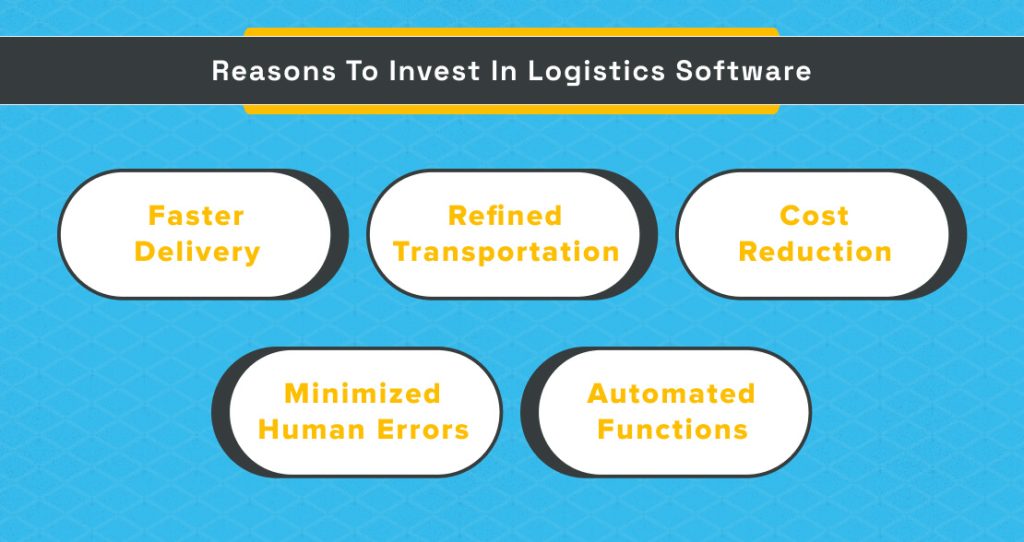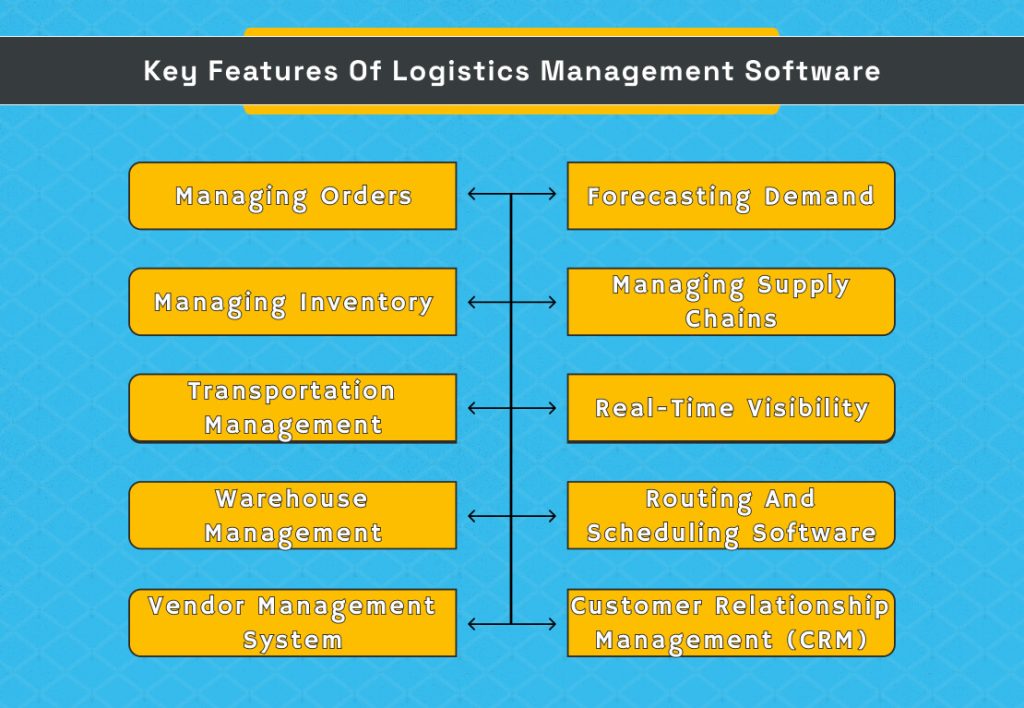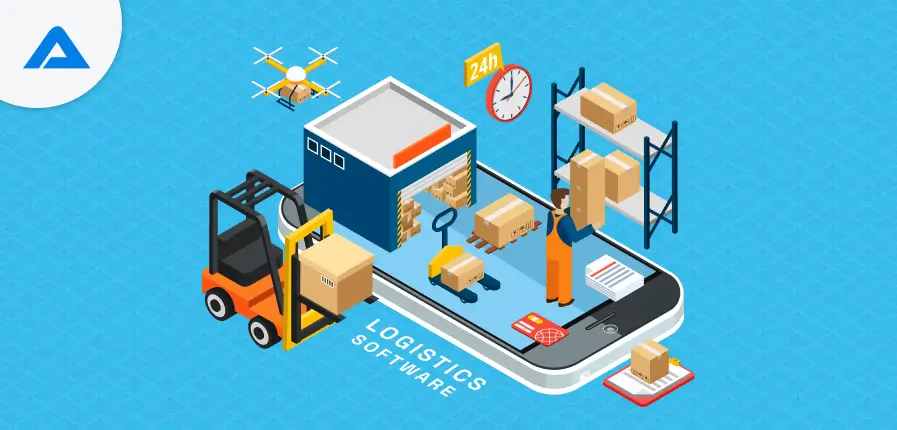The logistics industry is extremely complex. Businesses involved in logistics management are working hard to improve logistics management, improve the efficiency of the transportation process, and develop efficient delivery processes. However, problems that impact the supply chain will always exist. Being ahead of the curve is essential in this fast-paced, ever-changing world. Automated processes are the best technological solution for managing logistics services. Custom logistics software solutions will empower the business, decrease costs, and improve customer satisfaction.
Do you want to enhance your logistics operation with modern software tools? Do you want to improve your distribution infrastructure? This guide will help you understand the necessity and significance of logistics software development for your organization. This blog also provides information on the most effective solutions for creating logistics software that can determine the future of the logistics and shipping business.
So, let’s Begin.
What Is Logistics Software?
Logistics software refers to the control for moving items between the beginning and destination points to satisfy the needs of clients or companies. With the ever-changing fluctuations in the prices of gasoline and shipping, you need to utilize software that can aid you in managing the logistics of your business and running a successful company. This software can help ensure the efficiency and effectiveness of your process within your company.
This software will help you administer every product and transfer them to where they’re meant to go. Software for logistics focuses on transportation and logistics, which are the most challenging to monitor and can be costly at times. Logistics software development is a tool developed to aid firms in managing the plethora of parts that comprise the manufacturing process, from organizing the transportation of raw materials to transporting finished goods to retailers.
Reasons To Invest In Logistics Software Development

Logistics are essential to move goods where they are likely to be sold at the highest price. Logistics software is important in the supply chain since it helps move products from manufacturers to suppliers, vendors or distributors, and buyers. IT-related consulting firms highly recommend using software for all managerial jobs. Any company that is transferring the task to software for managing logistics the company can enjoy these benefits:
Faster Delivery
The supply chain and logistics business faces several challenges that impact delivery time and contribute to delays. With the help of logistics software, companies can speedily deliver their merchandise to clients. The logistics development services will increase the speed of delivery by making significant changes to the production process and choosing the right shipping service. The software can also significantly reduce shipping delays.
Refined Transportation
Transportation is one of the most important aspects of logistics. The most expensive costs are energy, fuel, labor, tolls on motorways, and shipping. Utilizing software for logistics will help you manage all the modes of transportation and use the operations data to help automate the process. Software for managing logistics allows you to quickly analyze the data and make appropriate choices to reduce costs while increasing effectiveness.
Cost Reduction
This can help reduce costs in many ways. The best way to cut down on unnecessary expenses is to avoid the risk of stockouts and overstocks by improving inventory management. Achieving efficient order management and continuous supply chain visibility allows your organization to reduce costs, which reduces labor costs while improving resource allocation.
Minimized Human Errors
Another benefit of having the right logistics management software is reducing human errors. Analyzing large amounts of manual-based transportation information can be difficult, time-consuming, and susceptible to mistakes. The logistics software will analyze these data with no errors in a shorter time. It can seamlessly move forward with the process with minimal or no delay.
Automated Functions
Process automation is a tremendous benefit of integrating logistics software. Certain tasks, such as creating shipping routes, load plans, and tendering loads for carriers, can be automatized and controlled using logistics software. Additionally, it reduces the need for paperwork and helps these processes effectively and promptly.
Key Features Of Logistics Management Software Development

Logistics software solutions helps delivery-focused firms manage various tasks ranging from providing raw materials to delivering the final products to their customers on time. Below are the essential features to be included within logistic software development solutions.
Managing Orders
This program can efficiently manage online orders. It can monitor many orders from the moment of placement until it delivers them. The order management feature can manage various operations like ordering and processing, scheduling storage, and delivery. Modern supply chain software development comes with features such as automated planning and optimization in real-time, including automatic bill generation.
Forecasting Demand
An analytical tool that predicts customers’ future demand for goods or services based on past statistics on sales, market trends, and advanced algorithmic techniques. This program assists companies in making well-informed inventory, production, and purchasing decisions that minimize shortages and situations of overstock. The ability to accurately predict demand helps maximize the efficiency of supply chain operations. It reduces the cost of holding and increases service levels.
Managing Inventory
Inventory management is vital for companies to monitor and analyze sales information in real-time. Software for managing logistics can help organize the process of tracking, organizing, and processing orders. It will save your company time and help businesses eliminate ordering mistakes. Automated fulfilment of orders could also save companies cash and help enterprises reduce the problem of shortages.
Managing Supply Chains
This is the core feature of LMS. It manages the entire transformation of raw materials into finished products. The entire process of shipping and production, as well as the search for optimal places and amounts, are covered within the range of this function. Managing supply chains can help increase a business’s profits and ensure its sustainability by improving customer service.
Transportation Management
This function can aid modern logistics and shipping companies in managing, planning, and managing the distribution of their finished goods from their warehouses to clients. Fleet managers can get the best delivery route planning and accelerate their delivery processes. By utilizing this method, they can cut operational costs because companies reduce time and expense. Transportation management is also able to aid companies in predicting timings for delivery.
Real-Time Visibility
This function can be used to determine the status of each item and consignment. This feature allows managers to view and communicate information regarding the location of an order in real-time throughout the entire process. This capability can improve the supply chain management process and help shipping companies make informed decisions. Monitoring consignments in real time can also benefit customers because they can access the data until they have received their order.
Warehouse Management
The feature is designed to monitor real-time product movement within warehouses physically. It uses IoT technology and sophisticated storage systems to guarantee that the products are in good storage conditions inside the warehouse.
Furthermore, the feature can trigger human intervention, resulting in an efficient and error-free delivery procedure. Through this option, businesses that sell eCommerce or shipping services will reduce the cost and chance of warehouse mistakes.

Take Control of Your Logistics with Custom Software Solutions. Start Your Journey with Us!

Pooja Upadhyay
Director Of People Operations & Client Relations
Routing And Scheduling Software
A tool specifically developed to improve the route and schedules of deliveries and pickups. The software uses real-time traffic and vehicle capacity data, delivery window times, and other limitations to produce effective route maps automatically. By reducing travel distances and time, the software improves speed, efficiency, and overall transport productivity, resulting in significant cost savings and enhanced client satisfaction.
Vendor Management System
It’s the main aspect of supply chain management. Shipping companies have access to the data of their suppliers and vendors anytime with this function. This feature can help them control the supply of essential products and keep track of inventory flow. In addition, it can be beneficial in maintaining business relations that could lead to more efficient services and prompt delivery.
Customer Relationship Management (CRM)
A custom-designed courier management system may include CRM development components. These can be used to save customer information, including order details, contacts, estimates, information about the customer’s payment, and other information.
The system ensures a precise recording of each transaction and facilitates logistic managers’ monitoring of inventory flow. Furthermore, courier and shipping businesses can keep track of their relationships with clients and gain access to required information at any moment.
Best Logistics Software Development Ideas 2024
In this section, we will look at the different types of logistics software development ideas that can help your business.
Distribution Management Systems (DMS)
A complete software system designed to manage and simplify the distribution process from the warehouse to the point of sales. DMS incorporates various aspects of the supply chain, such as the control of inventory, order processing, and resource allocation.
DMS gives real-time insight into stocks, product movement, and distribution across different sales channels. It ensures effective resource utilization, cuts down on time to market, and reduces operating costs. DMS can be crucial in maximizing the distribution process from warehouse to retail, ensuring that products get to their destinations quickly and effectively.
Fleet Management Software
The tool is comprehensive and designed to assist in controlling and monitoring a business’s vehicle fleet. It provides real-time monitoring maintenance, scheduling, and performance analytics. By offering insights into the vehicle’s condition, driver behaviour, and routing optimization, it guarantees safe, timely, and cost-effective fleet operations. It also assists with conformity with the rules, fuel management, and anticipatory maintenance—all vital to ensuring the longevity and efficiency of your fleet.
Software To Schedule Docks
Scheduling software assists companies and individuals across fields in operating more efficiently by allowing them to control and monitor their and employees’ hours, design and keep track of employee schedules, assign assignments or shifts, and monitor everything in real time.
Dock management software developed by a logistics software development company assists in tracking trailers and trucks entering and leaving the dock’s yard. It provides a common platform that simultaneously connects the transporter, vendor, and warehouse supervisor.
This software makes dock schedule management easier because it lets you operate more efficiently. One of the best features of this application is that it unites every aspect of an organization to ensure more efficient operation.
Enterprise Resource Planning
ERP is an application that businesses use to handle day-to-day tasks such as procurement, accounting, project management risk, compliance, and supply chain management. ERP generally refers to a specific type of business management software: a collection of integrated applications that an enterprise can employ to store, collect, manage, and interpret the data gathered from different business processes.
ERP Systems can be local-based or cloud-based. Cloud-based ERP applications have recently become more popular because data can be accessed anywhere with internet connectivity.
3PL (Third Party Logistics) Software
A custom software designed for third-party logistics companies. The platform simplifies the challenges arising from warehousing, transport administration, and managing outsourced logistics. With centralized access to data and real-time tracking features, and integrations with various tools for supply chain management, 3PL software enables these companies to provide efficient and economical solutions to their customers.
This software ensures the accuracy of inventory management, order fulfillment, and logistics coordination. This allows 3PL businesses to focus on scaling and customer satisfaction. The software can be a key element to operational efficiency in an ever-growing, dependent logistics industry.

Shipping Software
Shipping software provides various solutions to increase compliance, cut shipping costs, and ultimately become an asset to the shipping process. The systems you choose to use can assist companies in managing their entire shipment process, from calculating shipping costs to tracking delivery to your customer’s doorstep.
Shipping software lets businesses monitor the progress of their deliveries. It can also be used to customize delivery options and manage postal costs. This software helps make the shipping procedure easier by providing an understanding of the process and inventory management.
Load Board Software
A load board program is an online marketplace that allows shippers and freight brokers to search for freight carriers that will take their load. This enables freight carriers to earn more by finding loads that will allow them to keep their trucks full.
All sellers or buyers require carriers, and it can be not easy to permanently locate the right one. This software can assist you in finding carriers and running effective operations. The program offers various categories to help you choose the best transporter for your load and ensure a seamless operation.
Supply Chain Management Software
Software for managing supply chains (SCMS) is a set of software instruments or modules used to execute the supply chain, monitor supplier relationships, and monitor related business procedures. In automatizing these operations, SCMS helps businesses develop products, source logistics, produce, and more. Supply chain software applications give real-time analytics systems to regulate the flow of items and information through the supply chain.
Dispatching Software
This software uses automated email and SMS reminders for appointments, enhancing customer satisfaction and improving customer experience. It involves managing, assigning, and improving the scheduling and routes employees use in the maintenance, delivery, and service businesses. This software can ensure simple and precise delivery of products and client orders. Every company’s main goal is the safe transportation of goods and deliveries. This program offers live tracking for the software’s owner and customers, ensuring that businesses use it.
Drone Logistics Software
Advanced software designed to manage, plan, and optimize drone-based delivery. It includes a routing plan and airspace, appropriate logistics management software, live tracking, and elimination features. Since drone delivery is becoming more frequent, particularly in difficult-to-access regions or areas that require rapid delivery, the software will ensure the delivery of parcels quickly, precisely, and safely.
With automated navigation systems and weather forecasting modules, drone logistics software plays an essential function in developing innovative and efficient delivery options. This software closes the gap between modern technology and commonplace logistical issues.
Route Planning Software
Routing involves making specific maps of drivers’ routes to complete these deliveries. Software for routing will determine the exact sequence of deliveries that the driver makes to increase efficiency for the driver and service to customers.
It creates efficient routes for the entire fleet according to your business constraints and priorities, helping dispatchers by automating the task of manual scheduling. Automated scheduling and routing software orders are put into the software. After that, advanced algorithms design routes that align with agreed-upon customers’ requirements while using the least distance.
Public Transportation Software
It is a set of tools that makes public transportation more efficient for drivers, operators, and passengers. Its major components are terminal management, fleet management, and live driver and passenger information data.
The software must be top-quality for a program to function effectively. It must be reliable, consistent, and quick. It should also be comfortable and accessible. It should also be convenient, easy to use, inexpensive, safe, and affordable with routes that demand.
Reverse Logistics Software
An exclusive logistics software development idea, created to help businesses handle the reuse and return of their products. This software efficiently handles recycling, repairs, returns, refurbishment, and repair processes. It has tools that track returns in real-time to determine the most appropriate procedure (restocking, repair, replacing, or recycling) and improve communication between the customer and business on return statuses.
Through automation of these processes, Reverse Logistics Software ensures a smooth customer experience when returning items. Still, it helps companies to recover potential losses and ensure accurate inventory levels. In the current market of consumerization with returns on products, the software helps to keep a brand’s credibility and effectiveness.
Yard Management Systems (YMS)
A specialized solution for software that is designed to monitor the movements of trailers, trucks, and goods in transport yards. YMS gives real-time insight into yard operations, allowing organizations to plan prompt loading, unloading, and staging trailers. It has key functions like dock door scheduling, tracking assets, and gate control. It ensures a smooth movement of traffic, minimizes the amount of traffic in yards, and reduces waiting times.
By optimizing yard operation, YMS can speed up turnaround times, lower demurrage costs, and improve inventory accuracy. In complicated logistics settings, with numerous outbound and inbound deliveries, YMS maintains order and effectiveness.
Conclusion
Logistics management software development is a complicated procedure requiring various activities to guarantee a prompt service that provides a smooth experience. Suppose you recognize that you need a logistics application to improve the management of your supply chain, improve the use of resources, or automate the management of warehouses. In that case, you must start with choosing the best supplier. Engaging a knowledgeable and skilled partner increases the odds of having a fruitful and positive result.
Businesses must constantly look for more efficient and faster ways to ensure their customers are content. Additionally, the business changes and will likely continually present new issues. For this reason, you must be up-to-date and meet or exceed your expectations. Therefore, you must always be prepared to enhance your supply chain service and progress toward the highest level of operational efficiency.

Streamline Your Operations and Boost Efficiency – Get in Touch for a Personalized Logistics Software Solution

Pooja Upadhyay
Director Of People Operations & Client Relations

